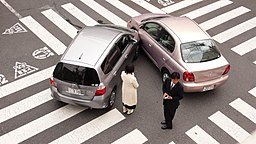The Devastating Impact of Traffic Collisions
Traffic collisions are an unfortunate reality of our modern world. Every day, countless lives are affected by these devastating incidents. From the loss of loved ones to severe injuries and property damage, the impact of traffic collisions is far-reaching and long-lasting. In this blog post, we will explore the various aspects of traffic collisions and the consequences they have on individuals, families, and communities.
The Human Toll
First and foremost, traffic collisions result in a staggering loss of human life. According to the World Health Organization (WHO), approximately 1.35 million people die each year as a result of road traffic crashes. This means that, on average, more than 3,700 people lose their lives every day due to these tragic incidents. The loss of a loved one in a traffic collision is an unimaginable pain that no family should have to endure.
Furthermore, traffic collisions often result in severe injuries that can have lifelong consequences. From broken bones to traumatic brain injuries, the physical toll on survivors can be immense. These injuries may require extensive medical treatment, rehabilitation, and ongoing care, placing a significant burden on individuals and their families. The emotional and psychological impact of such injuries can also be profound, leading to anxiety, depression, and post-traumatic stress disorder (PTSD).
Economic Costs
In addition to the human toll, traffic collisions also have a substantial economic impact. The costs associated with these incidents are staggering. According to a report by the National Highway Traffic Safety Administration (NHTSA), the economic cost of motor vehicle crashes in the United States alone was estimated to be $242 billion in 2010. This includes medical expenses, property damage, lost productivity, and legal fees.
These economic costs affect not only the individuals involved in the collisions but also society as a whole. Insurance premiums increase, healthcare costs rise, and businesses suffer from lost productivity. The financial burden placed on individuals and families can be overwhelming, leading to financial instability and even bankruptcy.
Emotional and Psychological Impact
The emotional and psychological impact of traffic collisions cannot be overstated. For those who have lost loved ones, the grief and pain can be unbearable. The sudden and unexpected nature of these incidents leaves families grappling with profound feelings of loss and emptiness. The trauma experienced by survivors can also have long-lasting effects on their mental well-being.
Individuals who have been involved in traffic collisions may develop anxiety or phobias related to driving or being a passenger in a vehicle. They may experience flashbacks or nightmares, reliving the traumatic event over and over again. The fear and anxiety associated with getting behind the wheel can have a significant impact on a person’s quality of life, limiting their mobility and independence.
Community Impact
While the immediate impact of traffic collisions is felt by individuals and their families, the consequences extend to the wider community. Collisions can disrupt traffic flow, leading to congestion and delays. This not only affects the daily lives of individuals but also has economic implications. Businesses lose customers, deliveries are delayed, and productivity suffers.
Furthermore, traffic collisions can strain emergency response systems. Ambulances, fire trucks, and police vehicles may be tied up at the scene of a collision, delaying their ability to respond to other emergencies. This can have life-threatening consequences for individuals who require immediate medical attention or are in need of emergency services.
Prevention and Awareness
Given the devastating impact of traffic collisions, it is crucial that we prioritize prevention and awareness. Education campaigns, stricter enforcement of traffic laws, and improvements in infrastructure can all contribute to reducing the number of collisions on our roads.
Investing in road safety measures, such as traffic calming devices and pedestrian-friendly infrastructure, can help create safer environments for all road users. Encouraging responsible driving behaviors, such as obeying speed limits, avoiding distractions, and wearing seat belts, is also essential in preventing collisions.
Additionally, raising awareness about the consequences of traffic collisions can help foster a culture of safe driving. By highlighting real-life stories and sharing the human impact of these incidents, we can encourage individuals to make responsible choices behind the wheel.
In Conclusion
Traffic collisions have a devastating impact on individuals, families, and communities. The loss of life, severe injuries, and economic costs associated with these incidents are profound and long-lasting. It is crucial that we prioritize prevention and awareness to reduce the number of collisions on our roads. By working together, we can create safer environments and prevent the devastating consequences of traffic collisions.
